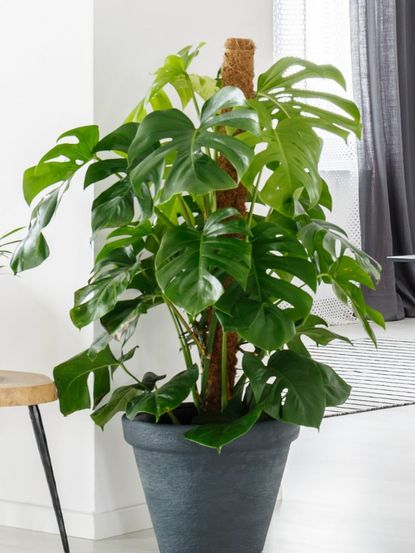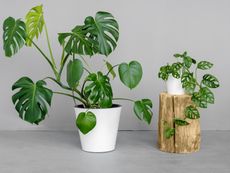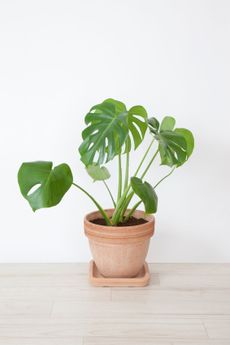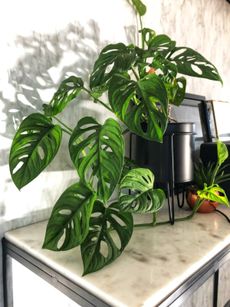How To Use A Moss Pole On Your Monstera Plant
A moss pole monstera is simply a Swiss cheese plant whose roots grow and attach to a moss-covered pole. Does this impressive plant need one of these? Yes! It’s an epiphyte that gets its nourishment from the surrounding air and water.


How To Support Your Monstera With A Moss Pole
Some plants get on the trendy list and just stay there, sort of like cool kids in high school. These houseplants are the ones that keep showing up in Instagram posts with sleeping cats.
Monstera made this list some time ago and, with its huge glossy leaves cut out like Swiss cheese, it’s totally understandable. But did you know that monstera is actually a tropical vine and requires staking on a monstera moss pole? Read on for details.
Does My Monstera Need a Moss Pole?
You’ve taken the plunge and now share your home with a monstera (Monstera deliciosa), also known as the Swiss cheese plant or Mexican breadfruit. At first, all goes well, and you watch the forest green, leathery leaves getting bigger and heavier. Maybe they even start to develop the deep “Swiss cheese” lobes that they are famous for.
But the stems of the plant aren’t strong enough to hold the plant up as the leaves get larger. Instead of climbing up to 10 feet (3 m) tall, the plant puddles into the container and flops around. That’s because monstera is actually a vine in the wild, using aerial roots to climb up the rainforest trees in Mexico and Central America. If you don’t happen to have any rainforest trees in your home, a monstera on a moss pole will be perfectly happy.
Benefits of Moss Poles for Monsteras
While the monstera you bought came in a container with soil, these plants are epiphytes, or air plants, in the wild. They grow on the surface of trees, getting food and water from nature: rain or the plant debris around them in the jungle canopy. Inserting a moss pole allows the plant to grow in cultivation as it grows in its natural growing environment.
A moss pole for monstera works perfectly to provide the vine the support it needs. That’s because the plant’s aerial roots penetrate the moss and attach there, making it easy for the vine to climb. Moss contains water and micronutrients as well, so a moss pole also offers the vine moisture and food as well, providing a second source of water. This helps the monstera to grow tall and healthy and encourages larger leaves with more of the iconic Swiss-cheese cutouts.
How to Make a Moss Pole for Your Monstera
Yes, you can buy a moss pole from some specialty plant nurseries. It is simply a pole on which moss is growing. They are useful for any climbing tropical plant since the moss on the outside mimics the spongy texture of the rainforest tree bark. Sometimes they are sold with the plant (e.g. moss pole monstera).
Gardening tips, videos, info and more delivered right to your inbox!
Sign up for the Gardening Know How newsletter today and receive a free download of our most popular eBook "How to Grow Delicious Tomatoes."
But it’s not very hard to make your own. Get a stake - bamboo or wood works well - and sphagnum moss, sheet moss, or coconut fiber sheet. Soak the “moss” in water in water for about 15 minutes, squeeze it out and attach handfuls of it to the pole with string. The moss should be about an inch (2.5 cm) thick on the top two-thirds of the stake.
How to Use a Moss Pole for a Monstera
How to use the moss pole for monstera The final step in this procedure is to assist the monstera in attaching to the stake. This is not necessary in the wild but is important when you are cultivating the plant outside its native realm.
How to Attach a Monstera to a Moss Pole
Insert the “naked” third of the moss pole into the soil of the pot that the monstera is growing in. Place it close to the vine and firm it into place. Attach the stem of the monstera to the moss pole with gardener’s twine. Water the plant thoroughly to help it to establish.
After a few weeks, start watering the plant as you normally do. As for the moss pole, spray it with water daily. That keeps it moist and soft so the monstera’s aerial roots can attach easily.
Repotting a Monstera with a Moss Pole
In time, you may need to repot the monstera. How to do this? Very carefully. You do not want to remove or shift the moss pole since the monstera will have its roots well-attached to it. Ripping out these roots is really not an option. Prepare a new container that is a little larger than the first.
Then enlist the help of a second person to remove the plant from its old pot, ideally with soil intact. Set the plant into the new pot and add more potting soil to fill in the edges and tuck the plant into place.

Bonnie Grant is a professional landscaper with a Certification in Urban Gardening. She has been gardening and writing for 15 years. A former professional chef, she has a passion for edible landscaping.
-
 Urban Composting Guide: How To Compost In The Middle Of The City
Urban Composting Guide: How To Compost In The Middle Of The CityUrban composting does not have to be daunting. You can compost in the city, and maybe even try some urban worm composting!
By Mary Ellen Ellis
-
 Shrub Diseases And Pests To Watch Out For
Shrub Diseases And Pests To Watch Out ForShrub diseases and pests can be challenging. Learn how to recognize and eradicate them before they can present a danger to your plants.
By Susan Albert
-
 Variegated Monstera Plant Varieties To Grow Indoors
Variegated Monstera Plant Varieties To Grow IndoorsMonstera are tremendously popular houseplants. Especially the attractive variegated Monstera deliciosa. Click to find out more.
By Bonnie L. Grant
-
 Different Types Of Monstera Houseplants
Different Types Of Monstera HouseplantsAs more people have discovered them, the number of monstera varieties available has increased. Here are some to look for.
By Mary Ellen Ellis
-
 Learn What To Do With A Leggy Monstera
Learn What To Do With A Leggy MonsteraLeggy monstera can be rehabilitated with a little know how. Pruning leggy monstera isn't difficult. Click here to find out more.
By Bonnie L. Grant
-
 Monstera Deliciosa Flower - Growing Swiss Cheese Plant For Flowers And Fruit
Monstera Deliciosa Flower - Growing Swiss Cheese Plant For Flowers And FruitConditions need to be just perfect for a Monstera to bloom, but it isn’t impossible for a Monstera to flower indoors. Click to learn how.
By Amy Grant
-
 Adanson’s Monstera Plant Care: Tips For Growing A Swiss Cheese Vine
Adanson’s Monstera Plant Care: Tips For Growing A Swiss Cheese VineAdding interesting houseplants is just one of the many ways that growers can continue to nurture their love of growing in small spaces or throughout the winter months. Adanson’s monstera plant is unique and can instantly add visual interest to any room. Learn more here.
By Tonya Barnett
-
 Repotting Cheese Plants: How And When To Repot Monstera
Repotting Cheese Plants: How And When To Repot MonsteraSwiss cheese plants should be repotted every few years to ensure adequate soil nutrition and space. Learn how to repot a Swiss cheese plant in this article for a long-lived, healthy specimen that graces your home or office.
By Bonnie L. Grant
-
 Propagating Monstera Deliciosa: Swiss Cheese Plant Cuttings And Seed Propagation
Propagating Monstera Deliciosa: Swiss Cheese Plant Cuttings And Seed PropagationSwiss cheese plant is a popular houseplant which will generally take root in soil with ease, but propagating Monstera deliciosa by other means can also be achieved. Learn more in this article.
By Nikki Tilley
-
 Proper Care Of A Swiss Cheese Plant
Proper Care Of A Swiss Cheese PlantThe Swiss cheese plant gets its name from its large, heart-shaped leaves, which as it ages, become covered with holes that resemble Swiss cheese. Learn more about the care of these plants here.
By Heather Rhoades